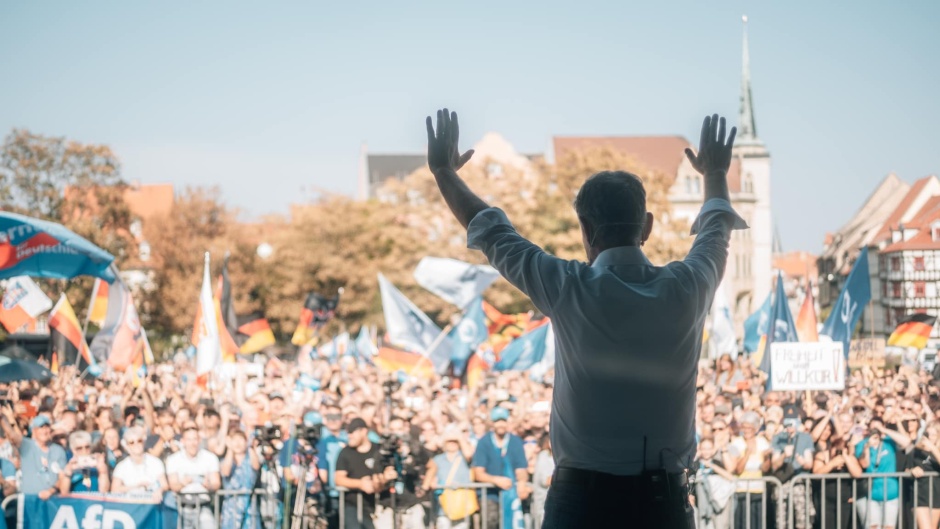In Germany, evangelicals pray for “courage to confront division, hatred and violence”
The first-ever victory of the far-right AfD comes in a context of growing divisions between how people in the east and the west of the country perceive society.
03 SEPTEMBER 2024 · 13:12 CET

Evangelical Christians in Germany are praying for “paths of reconciliation” in a country that has seen a huge increase in polarised debates.
In this context of division and political fighting, Germany needs “bridge-builders and peacemakers who believe it is possible for bring opponents together - in church, politics and society”, says the leadership of the German Evangelical Alliance (EAD).
The evangelical body has called believers to “pray for the courage to confront division, hatred and violence. We need people who carry the love of Christ into our country - even to strangers, people of other faiths and enemies”.

Five other evangelical groups are supporting this call to Christian leaders to spread in all churches an attitude of prayer for the future of the country, since “the spiritual dimension of division can only be overcome in prayer”.
The initiative was made public on 30 August, two days before the regional elections in the east of Germany were held, and a month ahead of the Day of German Unity (3 October), the celebration of of the German reunification of 1990.
Thuringia and Saxony make the divide visible
Right now, in Germany, the clearest sign of the east-west split is the prominence of Alternative für Deutschland, an “alternative” political movement that has managed to be at the centre of most societal debates.
Described by many analysts as the most extreme far-right party in Europe, it achieved its first major victory as Björn Höcke won the regional election of the land of Thuringia on 1 September. A survey found that 33% of Catholics and 31% of Protestants voted for him.
With a 32.8% of the general vote, the Alternative for Germany beat the major parties and left the Social Democrats of the German Chancellor Olaf Scholz at a very poor 6.1% of support. The result support for the Leftist regional premier also fell by a half, leaving this other progressive party without options to lead Thuringia for another four years.
Nearby, the voters in Saxony (another region in the east of Germany), also gave a record high support to the AfD, which came second, almost with the same result as the winners, the Christian Democrats CDU (30.6% vs 31.9%).
Media in Germany are saying the federal government of Germany, a country of 83 million inhabitants, might be close to a collapse, as Chancellor Martin Scholz (of the Social Democrats) may lose the confidence of the two other parties in the governing coalition (Greens and Liberals), which also had very weak results in the regional vote.
What does the AfD stand for?
Critics describe the AfD’s policies and its national leader, Alice Wiedel, as radical nationalists who seek to “clean” the country not only from migrants (including asylum seekers from war zones) but also from second generations of Germans with a foreign background.
In recent years, the AfD has gained much support after opposing the Covid-19 vaccinations and the strong restrictions during the pandemic. They have also been been critical of gender ideology and pro-LGBTQI policies. Its leaders insist that traditional parties want to paint them in a bad light because they are connecting with the real opinions of working people who are tired of the “political elite”.

A sign in a recent protest demands the "ban of the AfD" party. / Photo: Christian Lue, Unsplash, CC0In the last year, large demonstrations led by progressive organisations across Germany have demanded to ban the AfD for what they consider to be a return to “nazi” ideologies. Some of the party's local agrupations have been investigated by Germany’s Federal Office for the Protection of the Constitution for “extremism”.
Event the mainline Protestant Church of Germany (EKD) has repeatedly called Christians to not get involved with the AfD, saying the movement’s values clash with fundamental human rights and Christian standards on how to treat one’s neighbour.
Among free evangelical Christians, several organisations have expressed its opposition to all kinds of populism, but some believers consider AfD as a way to return to Christian conservative values in a country that has seen a secular worldview pushed by the authorities over the past years.
What are the dangers of populism?
“Populism can fulfil an important function, namely to demand more democracy. As long as the associated political ideology still functions within the framework of democracy, it can be a good instrument”, says Paula Diehl, a university professor who has researched this issue for over a decade both in Germany and elsewhere.
The problem, she told German Pro Medien Magazin in an interview earlier this year, is that sooner or later, “populism divides society into two power camps: the elites, who have the power, and the people, who do not”.
Movements such as the AfD are therefore able to “mobilise people very quickly” because “problems are always presented in black and white, grey areas are ignored”. But “finding common solutions” is much more difficult.
Specifically, “right-wing populism views the people as a homogeneous block that must not mix (…) It must be protected from invaders. At the centre is an anti-democratic core: the people are exclusive, hierarchies exist between people. This stands in contrast to the promise of democracy and universally valid human rights as well as equality between people”.
One more year
Learn all about our #OneMoreYearEF campaign here (English).
Published in: Evangelical Focus - europe - In Germany, evangelicals pray for “courage to confront division, hatred and violence”
